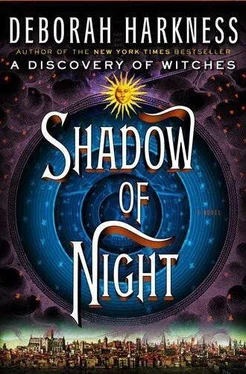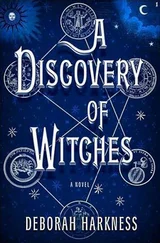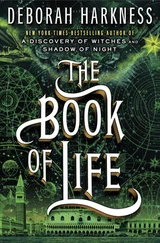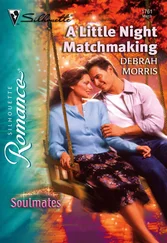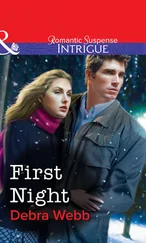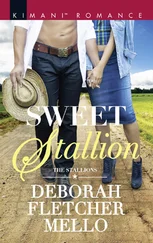“What have I done now?”
“You wanted to be seen, Diana,” he said harshly. “Well, you were.”
“Stop looking out the window. I’m tired of talking to the back of your head.” I spoke quietly, though I wanted to throttle him. “Who is Father Hubbard?”
“Andrew Hubbard is a vampire. He rules London.”
“What do you mean, he rules London? Do all the vampires in the city obey him?” In the twenty-first century, London’s vampires were renowned for their strong allegiance to the pack, their nocturnal habits, and their loyalty—or so I’d heard from other witches. Not as flamboyant as the vampires in Paris, Venice, or Istanbul, nor as bloodthirsty as those in Moscow, New York, and Beijing, London vampires were a well-organized bunch.
“Not just the vampires. Witches and daemons, too.” Matthew turned on me, his eyes cold. “Andrew Hubbard is a former priest, one with a poor education and enough grasp of theology to cause trouble. He became a vampire when the plague first came to London. It had killed nearly half the city by 1349. Hubbard survived the first wave of the epidemic, caring for the sick and burying the dead, but in time he succumbed.”
“And someone saved him by making him a vampire.”
“Yes, though I’ve never been able to find out who it was. There are plenty of legends, though, most about his supposedly divine resurrection. When he was certain he was going to die, people say he dug a grave for himself in the churchyard and climbed into it to wait for God. Hours later Hubbard rose and walked out among the living.” Matthew paused. “I don’t believe he’s been entirely sane since.
“Hubbard gathers up lost souls,” Matthew continued. “There were too many to count in those days. He took them in—orphans, widows, men who had lost entire families in a single week. Those who fell ill he made into vampires, rebaptizing them and ensuring they had homes, food, and jobs. Hubbard considers them his children.”
“Even the witches and daemons?”
“Yes,” said Matthew tersely. “He takes them through a ritual of adoption, but it’s nothing at all like the one Philippe performed. Hubbard tastes their blood. He claims it reveals the content of their souls and provides proof that God has entrusted them to his care.”
“It reveals their secrets to him, too,” I said slowly.
Matthew nodded. No wonder he wanted me to stay far away from this Father Hubbard. If a vampire tasted my blood, he would know about the baby—and who his father was.
“Philippe and Hubbard reached an agreement that exempted the de Clermonts from his family rituals and obligations. I probably should have told him you were my wife before we entered the city.”
“But you chose not to,” I said carefully, hands clenching. Now I knew why Gallowglass had requested that we dock somewhere other than at the foot of Water Lane. Philippe was right. There were times when Matthew behaved like an idiot—or the most arrogant man alive.
“Hubbard stays out of my way, and I stay out of his. As soon as he knows you’re a de Clermont, he’ll leave you alone, too.” Matthew spotted something in the street below. “Thank God.” Heavy footsteps sounded on the stairs, and a minute later Gallowglass and Hancock stood in our parlor. “It took you two long enough.”
“And hello to you, Matthew,” Gallowglass said. “So Hubbard’s demanded an audience at last. And before you suggest it, don’t even think about tweaking his nose by leaving Auntie here. Whatever the plan, she’s going, too.”
Uncharacteristically, Matthew ran his hand through his hair from back to front.
“Shit,” Hancock said, watching the progress of Matthew’s fingers. Making his hair stand up like a cockscomb was apparently another of Matthew’s tells—one that meant his creative well of evasion and half-truths had run dry. “Your only plan was to avoid Hubbard. You don’t have another. We’ve never been certain if you were a brave man or a fool, de Clermont, but I think this might decide the question— and not in your favor.”
“I planned to take Diana to Hubbard on Monday.”
“After she’d been in the city for ten days,” Gallowglass observed.
“There was no need for haste. Diana is a de Clermont. Besides, we aren’t in the city,” Matthew said quickly. At my look of confusion, he continued. “The Blackfriars isn’t really part of London.”
“I’m not going into Hubbard’s den and arguing the geography of the city with him again,” Gallowglass said, slapping his gloves against his thigh. “He didn’t agree when you made this argument so you could station the brotherhood in the Tower after we arrived to help the Lancastrians in 1485, and he’s not going to agree to it now.”
“Let’s not keep him waiting,” said Hancock.
“We have plenty of time.” Matthew’s tone was dismissive.
“You never have understood the tides, Matthew. I assume we’re going by water, since you think the Thames isn’t really part of the city either. If so, we may already be too late. Let’s move.” Gallowglass jerked his thumb in the direction of the front door.
Pierre was waiting for us there, tugging black leather over his hands. He’d swapped his usual brown cloak for a black one that was far too long to be fashionable. A silver device covered his right arm: a snake circling a cross with a crescent moon tucked into the upper quadrant. This was Philippe’s crest, distinct from Matthew’s only by the absence of the star and fl e u r - d e - l i s .
Once Gallowglass and Pierre were similarly outfitted, Françoise settled a matching cloak on Matthew’s shoulders. Its heavy folds swept the floor, making him look taller and even more imposing. When the four of them stood together, it was an intimidating sight, one that provided a plausible inspiration for every human account of darkly cloaked vampires ever written.
At the bottom of Water Lane, Gallowglass surveyed the available vessels. “That one might hold us all,” he said, pointing to a long rowboat and letting out an ear-piercing whistle. When the man standing by it asked where we were headed, the vampire embarked on a complicated set of instructions regarding our route, which of the city’s many docks we were going to put in to, and who would be rowing. After Gallowglass growled at him, the poor man huddled near the lamp in the bow of his boat and looked nervously over his shoulder every now and again.
“Frightening every boatman we meet is not going to improve relations with our neighbors,” I commented as Matthew boarded, looking pointedly at the brewery next door. Hancock picked me up without ceremony and handed me off to my husband. Matthew’s arm tightened around me as the boat shot out into the river. Even the waterman gasped at the speed.
“There’s no need to draw attention to ourselves, Gallowglass,” Matthew said sharply.
“Do you want to row and I’ll keep your wife warm?” When Matthew didn’t reply, Gallowglass shook his head. “Thought not.”
The soft glow of lamps from London Bridge penetrated the gloom ahead of us, and the crashing sound of fast-moving water became louder with each stroke that Gallowglass took. Matthew eyed the shoreline. “Put in at the Old Swan Stairs. I want to be back in this boat and headed upstream before the tide ebbs.”
“Quiet.” Hancock’s whisper had a sharp edge. “We’re supposed to be sneaking up on Hubbard. We might as well have proceeded down Cheapside with trumpets and banners for all the noise you’re making.”
Gallowglass turned back toward the stern and gave two powerful pulls with his left hand. A few more pulls put us at the landing—nothing more than a rickety set of steps, really, attached to some listing pylons —where several men waited. The boatman waved them off with a few terse words, hopping out of the boat as soon as he was able.
Читать дальше
